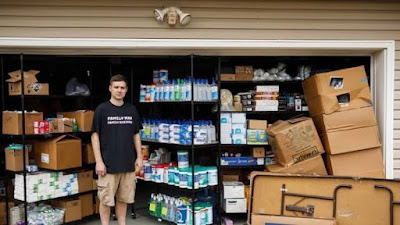Boxes, boxes everywhere - along with shoes, gameboys, and broken objects that you haven't used in a very, very long time. It's yours though, so you keep it hidden away in its own designated place.
You step into your washroom, only to find the toilet covered with bins of stuff. Deep down, you know this isn't normal but someday, you just know you'll put those things to good use.
You can't remember what's in those bins, though - toothbrushes, maybe your wedding dress? Truth is, you can't remember and so, you start to panic.
To make matters worse, your daughter cancelled her visit for the fifth time this month. You tell yourself that she's just busy, but you remember her last visit all too well. Stepping on boxes as she came though the front door, her comments didn't go unnoticed and so, you fought and she left shortly after.
Hoarding is a very quiet, yet deadly disorder. Gradually becoming worse over time, those who hoard don't see it as a disorder at all, but a hobby, like being a collector.
According to the Anxiety and Depression Association of America, hoarders collect many things, with the belief that their belongings are valuable, or holds sentimental value.
A lot of hoarders tend to keep objects because of the memories - the people and events associated with the object. They may see potential value in the things they hoard, even if it's just a magazine or a notepad.
Some feel safe when they're surrounded by their belongings, while others have a fear of being wasteful and so, they keep it instead of throwing it away.
The tricky part about Hoarding Disorder, is it can be masked by other disorders, such as; Obsessive Compulsive Personality Disorder, Obsessive Compulsive Disorder, Attention Deficit Hyperactivity Disorder, Anxiety, and Depression.
It's important to diagnose the hoarder correctly, because a
misdiagnosis can lead to all sorts of complications (wrong types of counselling, incorrect medication, etc).
On rare occasions, Dementia, Psychosis, or Prader-Willi Syndrome can be the underlying disorder. If you notice that your loved one displays signs of confusion, cannot preform everyday tasks.
Sometimes it seems to be withdrawn, then it is important that get evaluated by a health professional as soon as possible. The sooner the underlying disorder(s) are identified, the better.
Are you afraid that a loved one may have Hoarding Disorder?
By reading the following symptoms, you'll know what to look for:
By reading the following symptoms, you'll know what to look for:
• Refuses to throw away possessions, even if the stuff is broken or unusable.
• Continuously purchases objects, despite having a surplus.
• Displays signs of anxiety when trying to throw something away.
• Indecisiveness – they cannot decide where to put things or what to keep.
• Embarrassment or feeling overwhelmed by their possessions.
• Displays signs of anger when their belongings are touched.
• Constantly fearful of running out of certain items.
• Monitors and checks the trash for discarded objects.
• Suffers from financial stress, loss of space in home, isolation, and argues with marital
partner and family members.
partner and family members.
Hoarding not only affects the hoarder, but their family as well. The constant efforts made by family members will gradually build resentment and anger towards the hoarder, leading to awkward tension and disagreements.
Loved ones may stop visiting and this may cause the hoarder to feel left out. Imagine not being able to move around in your own home, to the point of isolation? Health problems, such as Respiratory Disease and Obesity, are frequent results from immobility and unsanitized objects in their home.
Next, we'll discuss potential treatments. Christiana Bratiotis, the director for the Hoarding Research Project at the Boston University, says that cognitive behavioral therapy has been proven to be helpful.
According to Christiana, cleaning up rarely helps and more than likely, the hoarder will fill up their living space shortly afterwards. They will be defensive and distrustful towards those who intervened, so that method is nothing more than a quick fix.
Cognitive behavioral therapy, on the other hand, is useful and provides insight on; improving organizational skills, understanding and working through emotion, and finding underlying stressors.
This remedy is more concrete, and can result in long-lasting behavioral changes. The difference between the first solution and the second one, is that therapy encourages the hoarder to look within for any underlying issues, while cleaning up their living space only focuses on the external factors, like cleanliness.
As of now, there is no medication on the market specifically made for Hoarding Disorder. Instead, medical professionals tend to prescribe medication for its underlying disorders, like Anxiety and Depression.
If you know someone who suffers from Hoarding Disorder, the best support you can give them, is to not judge their situation and work with them, not against them.
The goal is to provide the hoarder with a safe space that's free of personal attacks and judgement. That way, it'll be easier to seek out a remedy, and they'll be more inclined to listen, evaluate, and be open-minded towards treatment.
Conclusion
Health problems and unsanitized living spaces are just the tip of the iceberg. Hoarders can place their belongings in the closet all they want, but storing emotional issues, arguments, or the feeling of indifference is a big no-no. It starts with addressing the issues from within, and seeking the right support.
If you've enjoyed this post, kindly subscribe to receive email notifications as soon as I post something new. Don't forget to check your email and confirm your subscription. And lastly, share them with your friends.









1 Comments
This wasn't as helpful as I imagined.
ReplyDelete